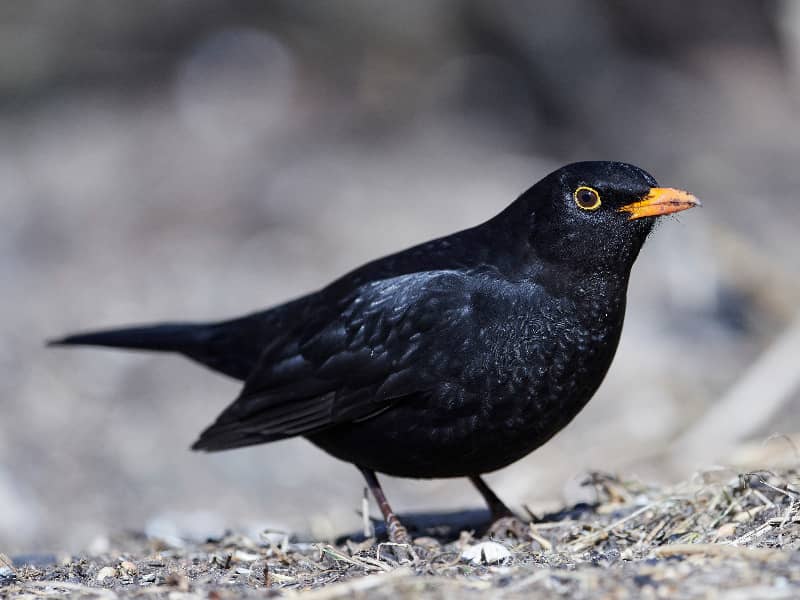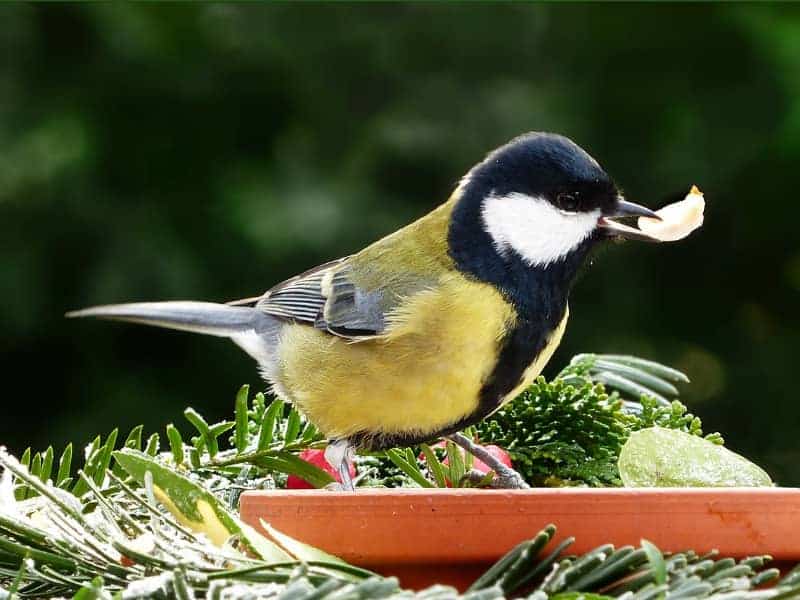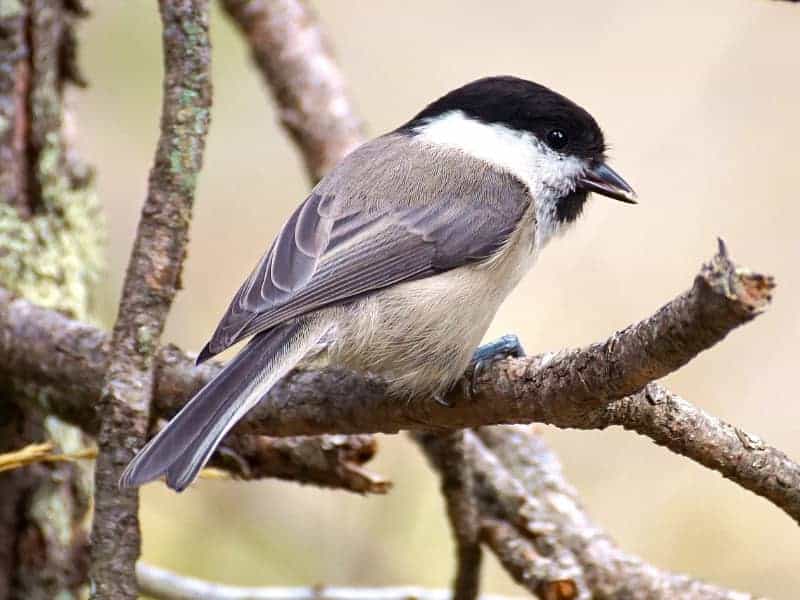
What do blackbirds eat?
If you've ever watched a blackbird in the garden, you may have noticed that it keeps swooping down to eat something. But what exactly do blackbirds eat? In this article you will learn more about the diet of these common garden birds.
Plant food of blackbirds
Blackbirds are omnivores and eat both plant and animal foods. Plant foods make up the largest portion of their diet. Here are some examples:
Berries and fruits
Blackbirds like to eat berries and fruits that they find on the ground or in bushes and trees. Particularly popular are, for example:
- Elderberries
- Currants
- Apples
- Pears
- Cherries
- Grapes
Seeds and nuts
Blackbirds also eat seeds and nuts, especially in autumn and winter when other food sources become scarce. They do this by searching for seeds and nuts, especially on the ground. Among their favorites are:
- Sunflower seeds
- Hemp seed
- Beechnuts
- Chestnuts
Other plant food
Blackbirds also eat other plant foods, such as:
- Flowers and buds
- Leaves and grass
- Herbs and wild plants
Animal food of blackbirds
In addition to plant food, blackbirds also eat animal food. Here are some examples:
Insects and spiders
Blackbirds depend on finding enough insects and spiders to raise their young, especially in spring and summer. They look for prey mainly on the ground and eat, for example:
- Beetle
- Flying
- Butterfly Caterpillars
- Spiders
Earthworms
Earthworms are an important food source for blackbirds. They use their beaks to search for earthworms in the soil and then pull them out. An adult blackbird can eat up to 50 earthworms per day.
Snails and other mollusks
Blackbirds also eat snails and other mollusks, such as slugs or isopods. They are particularly adept at this and can search for prey even in hard-to-reach places.
Overall, blackbirds are very adaptable birds and can adjust their diet depending on the season and availability of food. Plant food makes up the majority of their diet, but insects, spiders, earthworms and other mollusks are also important food sources for them.
Foraging and food intake
Blackbirds are omnivorous and eat both animal and plant foods. When foraging, they often move along the ground hopping and pecking, looking for prey. In doing so, they use their sight and hearing to locate their food.
Feeding is done by pecking and shredding. For small insects and seeds, they usually pick up the food in their beaks and swallow it directly. Larger prey such as snails are often smashed against a hard surface to break the snail shell and get to the meat.
Importance of food for blackbirds
Diet has a great influence on the health and reproduction of blackbirds. A balanced diet helps the birds stay healthy and reproduce successfully. An unhealthy diet, on the other hand, can lead to deficiencies and diseases that affect the blackbirds' chances of survival.
Effects of nutrition on health
The blackbirds' plant-based diet provides essential nutrients such as vitamins, minerals and fiber, which are important for healthy digestion and a strong immune system. Berries and fruits also contain valuable antioxidants that protect the blackbirds from harmful environmental influences.
Animal food is also important for the health of blackbirds. Insects and worms provide valuable proteins needed for tissue growth and repair. Earthworms are also rich in minerals such as iron, which are needed for the formation of red blood cells.
Role of nutrition in reproduction
A balanced diet is also important for blackbird reproduction. During the breeding season, the birds need especially many nutrients to produce eggs and raise their young. Inadequate nutrition can result in the eggs not forming properly or the chicks being weakened.
In summary, a healthy diet is very important for blackbirds. Therefore, make sure that your garden offers a variety of food so that the blackbirds can eat a balanced diet. Also, make sure that unhealthy foods such as bread or garbage are not within their reach.
Influence of man on the diet of blackbirds
Our modern lifestyle inevitably affects the diet of blackbirds. Although as wild birds they are basically able to feed themselves, we can influence their diet. Here are some factors that can lead to changes in the blackbirds' diet:
Changes in food supply
Our gardens and parks are not as wild and natural as they once were. Planting exotic plants and removing wild growth may result in a scarcity of food for blackbirds. The plants we plant in our gardens may not produce berries or fruits suitable for blackbirds. In this case, they must turn to other food sources.
Possible consequences for the blackbirds
A lack of food can affect the survival rate of blackbirds. If they can't find enough food, they can become malnourished, leading to a higher susceptibility to diseases and parasites. Reproduction can also be affected, as blackbirds need a balanced diet to lay eggs and raise their young.
Conclusion - What do blackbirds eat?
Blackbirds are adaptable birds that can adapt to different environments and food conditions. They feed on a variety of plant and animal foods that they can find in our gardens and parks. But modern human lifestyles can affect their diet. However, if we take care to plant natural and native plants, we can help ensure that blackbirds find enough food. Let's make sure that these pretty birds continue to fill our gardens with their melodious songs!
Author

-
Garden animal - A life with nature
Welcome to my animal blog! My name is Dirk and I am happy to take you on my journey through the fascinating world of animals and gardening.
Born 54 years ago, I have had an insatiable curiosity for the animal world around me since childhood. Although I have moved professionally in other industries, my true passion has always been animals and nature. It is remarkable how a small garden has become such an important part of my life.
Many of my fondest memories are associated with the animals that share our home. Whether it's the curious squirrels that scurry across the trees in the morning, the colorful variety of birds that visit our feeders, or the busy bees and butterflies that pollinate our flowers, every moment with them is invaluable to me.
This blog is my contribution to share my experiences, discoveries and insights with like-minded people. Here I will share stories of unforgettable encounters with animals, give tips on gardening and creating wildlife-friendly habitats, and take you on my journeys through nature.
Thank you so much for being here!
Cordial,
Dirk aka garden animal
Last posts
- 27. February 2024PetsVeganes Hundefutter – Grün und Gesund?
- 18. January 2024ChickensOregano für Hühner
- November 27, 2023HamsterDiurnal hamsters
- November 24, 2023HamsterHamster hammock


